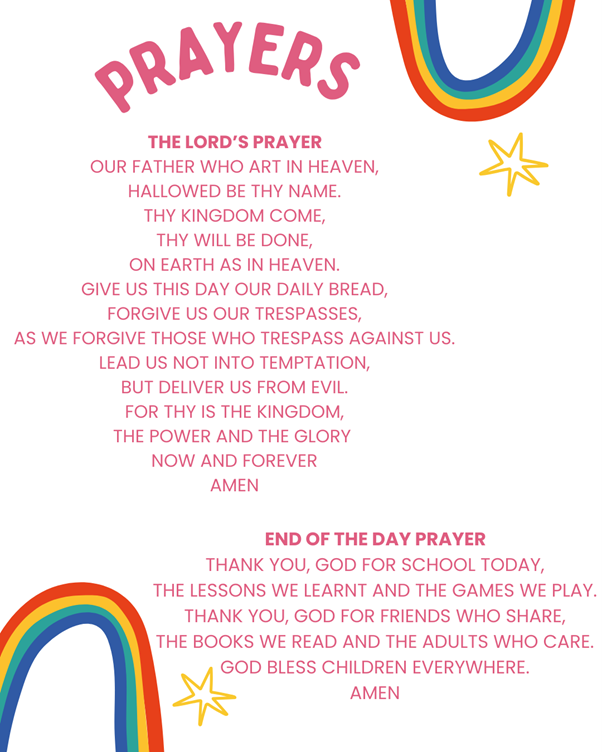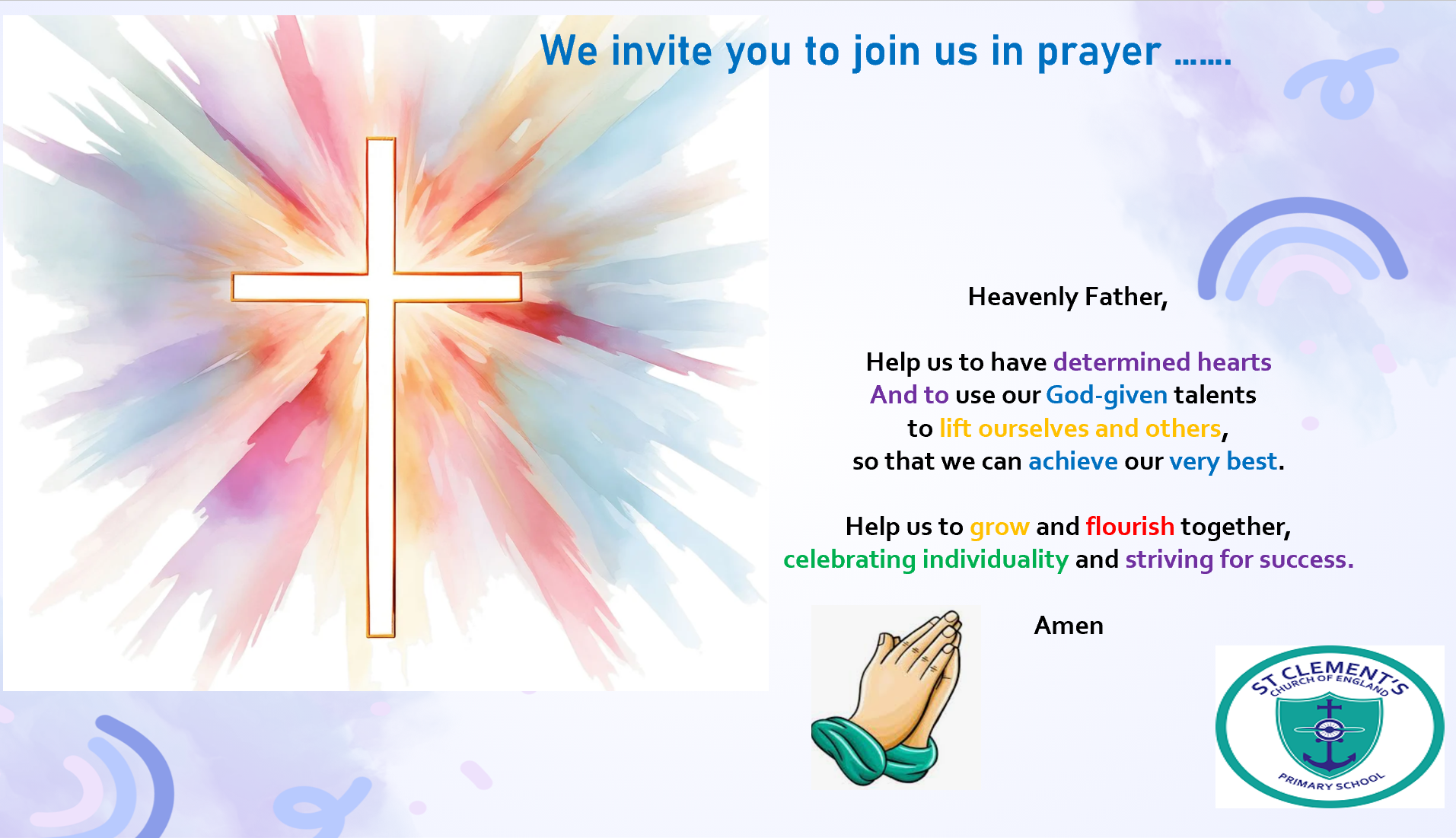Collective Worship
The Importance of Collective Worship at St Clement’s CEP
Our Collective Worship policy strengthens and supports the Christian identity of our school, reinforces our vision and values, and celebrates the unique and diverse contribution that each child makes to our community.
Our worship reflects the rich traditions of the Church of England and follows the Christian liturgical year. The daily act of Christian worship is central to our ethos and is supported by all staff and governors. It plays an important role in the spiritual, moral, social, and cultural development of our entire school community.
Collective Worship will be:
Inclusive – Our acts of worship recognise that pupils and staff come from a variety of faith backgrounds, as well as no faith background. Worship is designed to be inclusive and fully accessible to all. Care is taken to use language that does not assume the faith of anyone participating, listening, or watching.
Invitational – Participation in worship is never compulsory. Pupils and adults are invited, but not expected, to engage. Those of different faiths, or with no religious faith, are welcome to be present and engage in a way that feels authentic to them. Praying and singing are only encouraged for those who wish to take part.
Inspiring – Our worship encourages reflection on big questions about who we are and how we live. Pupils and adults are given time to think, reflect, and consider their own actions as well as their contribution to the wider community. Worship aims to motivate everyone to grow spiritually, reflect together, and be inspired to act with integrity and kindness.
Collective Worship at St Clement’s provides pupils and staff with the opportunity to:
-
Engage in an act of community
-
Express praise and thanksgiving to God
-
Be still and reflect
-
Explore the big questions of life and respond to national events
-
Foster respect and deepen spiritual awareness
-
Reflect on the character of God and the teachings of Christ through Biblical texts
-
Affirm Christian values and attitudes
-
Share each other’s joys and challenges
-
Celebrate special times in the Christian calendar
Parental Withdrawal
Worship is a special part of our school day, where we come together as a school family. Reflecting our ethos as a Church of England school, collective worship is inclusive, welcoming those of all faiths and none to participate with integrity.
We also respect the legal right of parents to withdraw their child or children from acts of collective worship. We welcome the opportunity to discuss this decision with parents, and any formal request to withdraw a child should be made in writing to the Headteacher.
Aims of Collective Worship
Collective Worship offers pupils, staff and the wider school community the opportunity to:
- Gather together to share sacred moments of joy, challenge, grief and love.
- Explore the school’s distinctive Christian vision and values in action
- Reflect on the nature of God and on the teachings of Christ through Biblical texts
- Express praise and thanksgiving to God
- Be still, pray and reflect
- Explore the big questions of life and respond to national events
- Become Agents of Change, working to make a positive impact upon their own lives, lives within the community and wider world
- Foster respect and deepen spiritual awareness
- Explore Christian values and attitudes
- Share each other’s joys and challenges
- Celebrate significant and special times in the Christian calendar
Implementation
Collective worship is planned by a variety of stakeholders including staff, pupils, when possible, the incumbent of our local church and external visitors from World Religions: Judaism, Sikhism and Hindus in consultation with the collective worship leader. This act of worship will take place at the school day and in any regular school grouping e.g. whole school, key stage or class. Our school plans systematically and cohesively use Canterbury Diocesan Collective Worship Planning which is adapted and changed to meet the needs of our community, by the children and teachers. This ensures that there is a shared understanding of the long- and short-term planning of worship and this enables continuity.
Our Collective Worship Timetable
|
Monday |
Tuesday |
Wednesday |
Thursday |
Friday |
|
Whole School Worship |
Whole School Worship |
Singing Worship |
Child Led Whole School Worship |
Celebration worship |
|
Headteacher or Deputy Head |
Headteacher or Deputy Head |
Teacher Led |
Class led |
Headteacher or Deputy Head |
We are mindful of the variation in personal, spiritual styles and provide a range of creative opportunities to enable all to engage in the acts of worship. These include: music, videos, silence, symbolism, drama, and use of IT.
Our worship consists of 4 stages:

Gather – we welcome the community, for example, (with music, liturgy and the lighting of a candle)
Engage – we share, for example, (a Bible reading, followed by an activity to engage pupils with the Christian message). We look outwards and learn
 Respond – pupils, for example, (discuss, share, reflect, pray or sing). We reflect on our experiences.
Respond – pupils, for example, (discuss, share, reflect, pray or sing). We reflect on our experiences.
 Send – We share the message of worship again and encourage pupils to reflect on how they will let it guide their day, learning, and behaviour.
Send – We share the message of worship again and encourage pupils to reflect on how they will let it guide their day, learning, and behaviour.
We close with liturgy, a final prayer, music, and the blowing out or turning off of our special candles.
Guiding Lights
Guiding Lights lead termly Collective Worship: Harvest, Remembrance, Christmas and Easter. Music will be played and set up before Collective Worship begins allowing for children to walk in and out silently; Worship Adults will ensure children are settled and sitting in silence.
Prayers
Saying prayers together is an important part of everyday life at St Clement’s CEP. We say different prayers at different times of the day, and it would be useful if you could help your child to learn them. During worship we also encourage the children to make up and say their own prayers so that they recognise that they can have their own conversations with God whenever they like – these often go along the lines of: thanking God for something, saying sorry for something and asking for help.

Our School Prayer

Here are some of our prayers, read by our children.
/i/video/MicrosoftTeams-video__13_.mp4
/i/video/MicrosoftTeams-video__11_.mp4
/i/video/IMG_1254_1.mov

 St Clement's Church of
England Primary School
St Clement's Church of
England Primary School